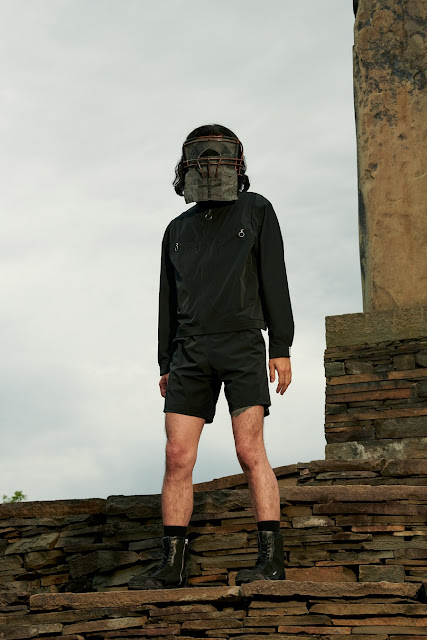Kozaburo. Menswear - Spring 2020.
Images from the designer and the public domain. Credited to the photographer/company where applicable: Kozaburo)
Covering Kozaburo Akasaka's collections have been a personal favorite of mine. He's only had two seasonal collections to date, for the Tokyo-born Brooklyn NY based designer who has neither rushed nor imprinted a blunt stamp onto the fashion world, rather Akasaka had set upon a subtle, yet complex representation of his style and aesthetic influences. This is not minimalism per se, his collections echo a uniqueness. A power of the lone masculine, since his styles are of menswear arrays, Kozaburo impresses on one of the deepest and intense of emotions that is unique to the male; the rogue, antihero, rake and rebel. Passing through landscapes and time, neither morally connected to what might be deemed good or bad, but simply surviving. He is the entity of detachment.
I do not see Akasaka's Spring offering a version of post-90s street wear immaturity of the man-child, which is not appealing to me. Instead, Akasaka has portrayed more of a sombre version of so called street wear or sports styles. To which he has been able to mature the concept, making it more relevant to Akasaka, reflecting a personal insight into his latest collection that he is looking “inward”, an introspection within passing moments of the self. That, as Akasaka ponders his Spring collection he manifests the “storm” one must face both external and internal, to remove the duality is to understand the two. Whilst aware that we must embrace and release the turmoil. This is a personal journey and one that must endure alone. A focus of thought and meditation, to not search for enlightenment or even meaning, rather to practice, be humble and free of material bondage. Time is short. Life ends. But, also savour the temporary within the manifestation of the life cycle. The motivation is be one with the these moments.
The hidden and partially covered faces of the models maybe Akasaka's homage to the Fukeshû Zen Sect of federal Japan, a mysterious order of Zen monks. These warrior adherents of Zen called the Komusô (虚無僧 monks of the Emptiness) who played the traditional mediative tunes via a flute known as the Shakuhachi, while hiding their faces, under weaved reed baskets. Symbolized a detachment from the world. Which I feel Akasaka Spring collection is representing, the detachment from materialistic urges – that in turn as a fashion designer to also, paradoxically, use the material world. To survive. With the raw backdrop of rocks and the layers of the Earth – it is the impermanence of everything.
Recycled nylon and polyester, organic cotton, Kaya (Japanese Hemp) weave, linen and denim. A rugged and stalwart collection, a mediative focus. Which is set upon the rawness of nature that is the beautiful as we entwined a defiance.









Comments
Post a Comment